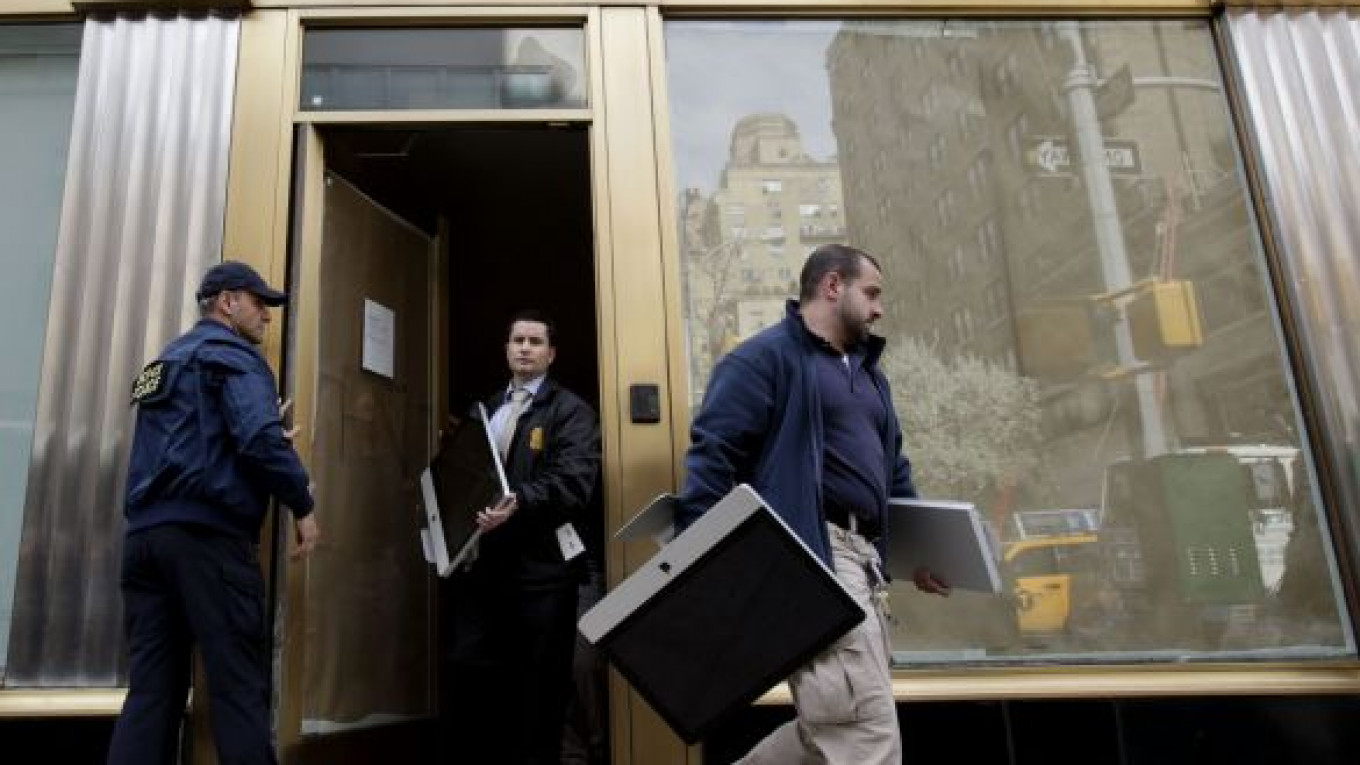One of Russia's top reputed mobsters, Alimzhan Tokhtakhunov, has been charged in what U.S. investigators said was a Russian organized crime operation that included illegal, high-stakes poker games for the rich and famous and threats of violence to make sure customers paid their debts.
The charges against Tokhtakhunov — already under indictment in a separate U.S. case accusing him of bribing judges at the 2002 Winter Olympics in Salt Lake City — and 33 other people "demonstrate the scope and reach of Russian organized crime," said George Venizelos, head of the New York FBI office.
"The defendants are alleged to have handled untold millions in illegal wagers placed by millionaires and billionaires, laundered millions, and in some cases are themselves multimillionaires," he said. "Crime pays only until you are arrested and prosecuted."
New York police chief Raymond Kelly said proceeds from the high-stakes illegal poker games and online gambling were allegedly funneled to organized crime abroad.
U.S. authorities charge a reputed mob kingpin and 33 others believed to be part of a criminal enterprise with strong ties to Russia.
In a two-month period beginning in late 2011, the money-laundering ring paid Tokhtakhunov $20 million in illegal proceeds, according to an 83-page indictment unsealed in New York on Tuesday.
Along with the illegal poker games, the ring operated "an international gambling business that catered to oligarchs residing in the former Soviet Union and throughout the world," the indictment said.
Prosecutors alleged proceeds were laundered through shell companies in Cyprus and in the United States by a criminal enterprise with strong ties to Russia and Ukraine.
Tokhtakhunov, known in the criminal world by the nickname "Taivanchik" for his Asian features, used his reputation as a mobster to "resolve disputes with clients of the high-stakes illegal gambling operation with implicit and sometimes explicit threats of violence and economic harm," according to court documents.
Tokhtakhunov's whereabouts were not immediately clear. He lives outside of the U.S. and has been spotted at celebrity events in Moscow, including an invitation-only 2011 gala hosted by the Federation charity. Among the other 100 guests at the event were movie stars Woody Allen, Steven Seagal, Kevin Costner, Francis Ford Coppola, Sophia Loren and Andy Garcia and the tenors Jose Carreras and Andrea Bocelli.
Tokhtakhunov was indicted by federal authorities in New York in 2002 on charges that he plotted to rig the Salt Lake City Winter Olympics pairs figure skating and ice dancing competitions.
He was arrested that year in Italy, whose highest appeals court ruled in 2003 against extraditing him to the U.S. He was released by the Italian court.
Assistant U.S. Attorney Harris Fischman told a U.S. magistrate judge in Manhattan on Tuesday that another suspect, Vadim Trincher, 52, directed much of the international racketeering enterprise from his $5 million apartment in Trump Tower.
"From his apartment he oversaw what must have been the world's largest sports book," Fischman said in a successful argument to have Trincher held for trial without bail. "He catered to millionaires and billionaires."
Trincher's apartment is located directly below one owned by Donald Trump, authorities said.
The related poker operation in New York and Los Angeles that served wealthy U.S. clients was allegedly run by Hillel "Helly" Nahmad, a leading international art dealer and the owner of an exclusive art gallery that bears his name inside Midtown Manhattan's posh Carlyle Hotel, a spokeswoman for Manhattan U.S. Attorney Preet Bharara said.
About 30 defendants in the case are in custody.
None of the rich and famous clients of the alleged ring were charged or named by authorities.
Material from The Associated Press and Reuters was included in this report.
Related articles:
A Message from The Moscow Times:
Dear readers,
We are facing unprecedented challenges. Russia's Prosecutor General's Office has designated The Moscow Times as an "undesirable" organization, criminalizing our work and putting our staff at risk of prosecution. This follows our earlier unjust labeling as a "foreign agent."
These actions are direct attempts to silence independent journalism in Russia. The authorities claim our work "discredits the decisions of the Russian leadership." We see things differently: we strive to provide accurate, unbiased reporting on Russia.
We, the journalists of The Moscow Times, refuse to be silenced. But to continue our work, we need your help.
Your support, no matter how small, makes a world of difference. If you can, please support us monthly starting from just $2. It's quick to set up, and every contribution makes a significant impact.
By supporting The Moscow Times, you're defending open, independent journalism in the face of repression. Thank you for standing with us.
Remind me later.






